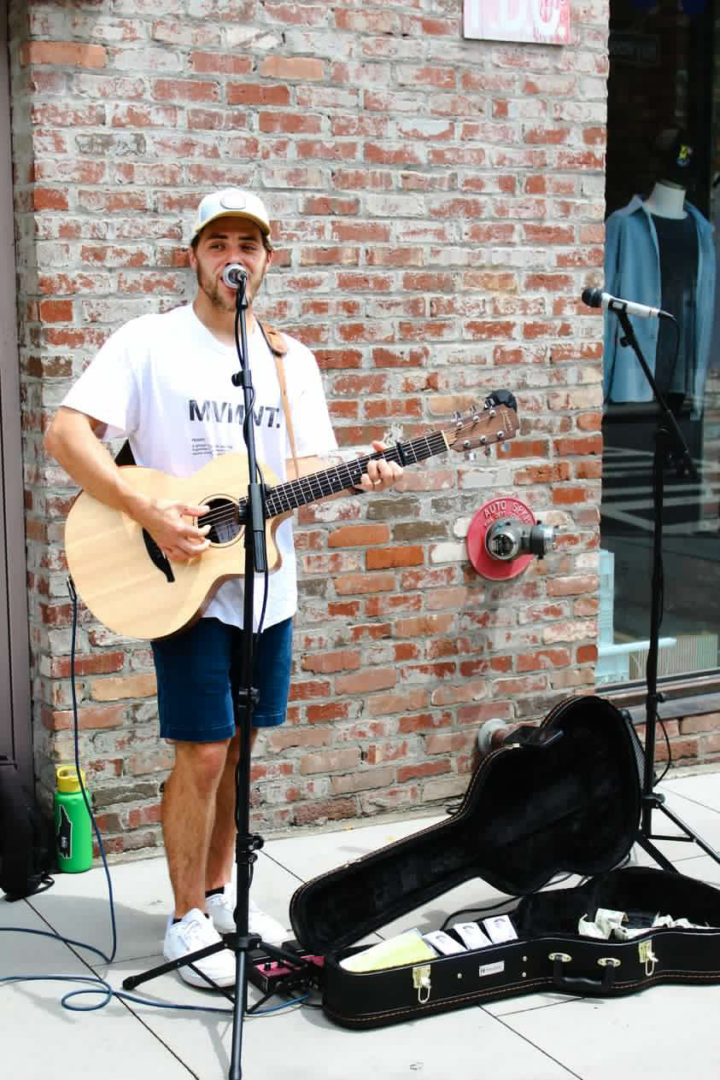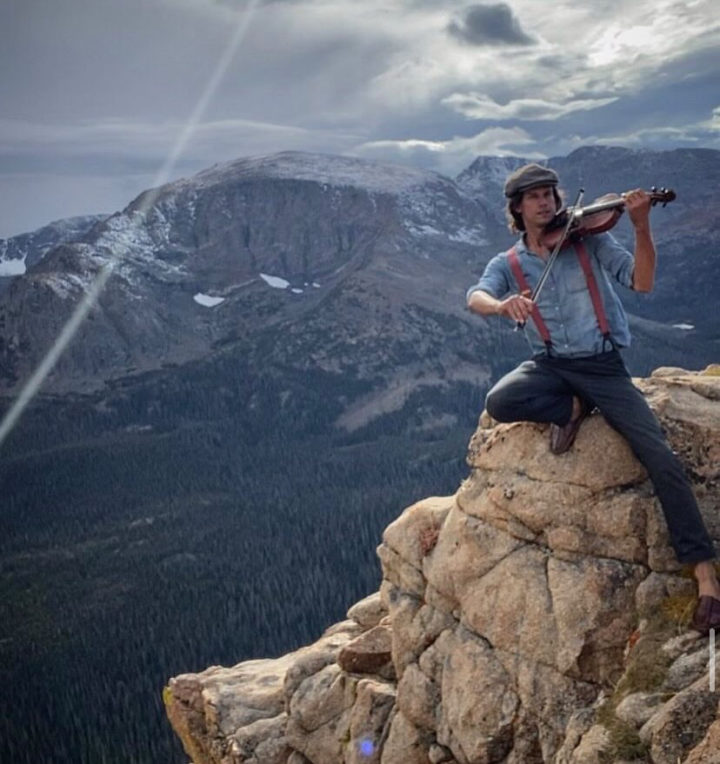by Jason Chen
Take a walk in downtown Asheville, and you’re bound to hear a cacophony of sounds — from firetruck sirens racing down College Street to enthusiastic riders cheering loudly on the Amazing Pubcycle as they pedal through the city’s main thoroughfares.
Amid the din, melodies ring from buskers stationed at popular spots on Haywood Street, Pack Square and Pritchard Park. Many of these performers have been staples in the area for years, others are more recent arrivals.
Xpress chatted with a few of these musicians to learn more about the thrills and pitfalls of the art form, as well as the economic realities that come with performing on the street.
A notebook and a piece of bamboo
Odds are good that pedestrians around Pritchard Park will at some point hear Adrian Byington howling and banging his djembe drums to an eclectic mix of funk, jazz and rock ’n’ roll standards. With his frizzy, long hair and tie-dye shirt, he represents the bohemian, mountainous spirit that many associate with Asheville.
Granted, Byington is originally from Winston-Salem, where he says a chance encounter in his hometown led him to busking at the age of 16.
“I was just walking in Winston one day, and I saw this guy named Julian, and he was playing guitar,” Byington remembers.
Inspired, Byington offered to provide percussions to the musician’s set. The only problem was he didn’t have his kit. Nevertheless, Julian accepted Byington as a bandmate. That day, he hammered away on a notebook and piece of bamboo. Later, he brought his actual kit into the mix.
“We would split the tips,” Byington continues. With the money earned, he adds, he eventually purchased two djembes.
Nearly 20 years later, he’s still at it.
According to Byington, who has been busking in Asheville since 2010, the scene was once so lucrative that he supported himself solely on the tips earned from his music. Nowadays, he has to pick up occasional jobs in kitchens or bars to pay the bills.
Nevertheless, Byington says he remains committed to busking because it gives him a strong sense of identity and purpose.
“It makes people happy, and that’s the main reason why I do it,” he adds. “To see people smile.”
Spiritual messages
Like Byington, Jimmy Clifton also stumbled into the busking life. Raised in Hendersonville, the Christian singer-songwriter, began performing his music on the streets of his hometown in 2016.
“I didn’t really do it for tips or anything,” he explains. “But then someone gave me a dollar, and I was like, ‘OK, maybe I should do this.’”
Last year, Clifton redirected his attention to downtown Asheville, where he often finds bigger crowds. Most days, locals and tourists alike can spot him either set up adjacent to Urban Outfitters on Haywood Street or near Chai Pani on Battery Park Avenue. His set includes a mix of old hymns, original Christian-themed material and more mainstream indie tunes such as Bon Iver’s “Skinny Love.”

An avid songwriter, Clifton’s composed more than 700 original pieces. Busking, he notes, is a way to promote his material as well as share the spiritual messages these songs express. His street performances, along with paid gigs, are Clifton’s sole source of income. He notes the money he earns has allowed him to support himself and his wife, who is currently caring for her father, who has amyotrophic lateral sclerosis, commonly known as Lou Gehrig’s disease.
“I have gigs booked out through October,” he says.
The locations themselves, he adds, vary from farmers markets to breweries, as well as at wedding receptions at the Biltmore and the Omni Grove Park Inn.
And with around 120,000 monthly listeners on Spotify, Clifton is slowly taking off online. Nevertheless, he continues to busk. “Honestly for practice,” he says.
For Clifton, establishing good relationships with other buskers and business owners is key. “It gets hard sometimes because you’re playing on the street and you don’t always realize that you’re outplaying somebody,” he explains.
With his fourth album, There’s Proof of God but Time Is Short, released on Spotify on June 30, passersby are likely to hear new material throughout his set. And if things go Clifton’s way, they may also absorb some of his songs’ spiritual messaging as well.
Business mindset
No matter how talented or optimistic a busker might be, sometimes his earnings can trickle to a halt during the colder months when there are fewer tourists in town. For some buskers, such as Timothy Kelley, an Asheville-based fiddler, the slower season is the main reason for hitting the road.
The solo artist says he’s managed a full-time career as a busker by living in his van and traveling to warmer locations when necessary. Austin, Texas, and St. Petersburg, Fla., are among the cities he frequents.
When speaking to Kelley his excitement is apparent — not just about the music he plays but about the lifestyle itself. And he

is quick to offer advice for making it work as a roaming busker.
“You have to have a business-oriented mindset,” he explains. “You’re putting on a concert for people in the street, and the more you do that, the better you get at it. To me, the perfect business model for a musician is to put your case out in the street and see what you can get gratuity-wise.”
At the heart of his philosophy for success is authenticity.
“When somebody walks by, you probably have just about 15 seconds at most to try to tug on their heart strings or make them feel something or whatever. Being a busker makes you as authentic as possible, because you have to feel that in order for them to be able to feel it. You have to feel it within yourself.”
Such a nomadic and adventurous life can wear him down sometimes. Kelley has run out of gas before in Wyoming, and he has stayed up penniless before in a park in Florida. However, he has managed to cultivate an optimism that continues to drive him.
“Always put your best foot forward,” he says. “Go into the street as happy as possible, even if your mind isn’t in the right place. Because sometimes you get done, and by then, your mind is in the right place. Music is like therapy in a lot of ways.”




Love the spirit of these folks. Maybe I’m old school and not hip to it but amplified busking just does not seem to fit the venue.